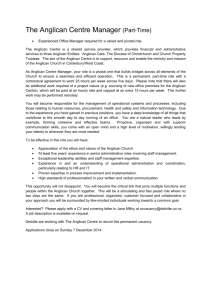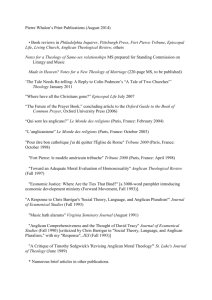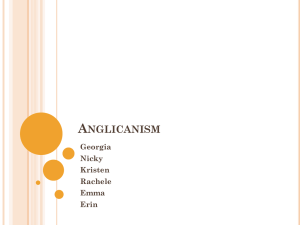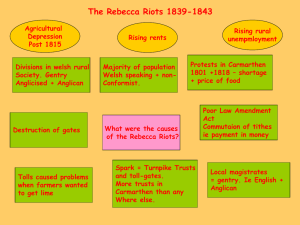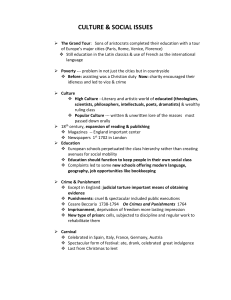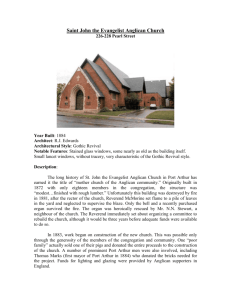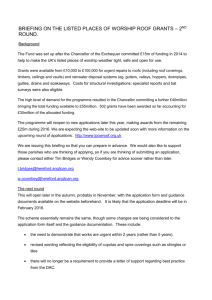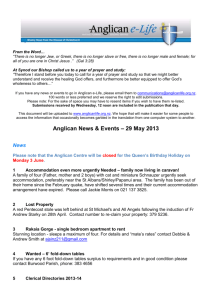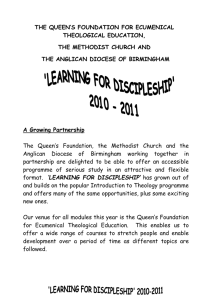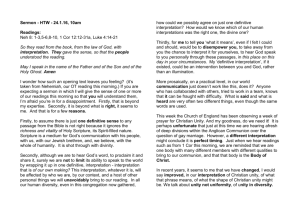Affidavit of the Rt. Rev.Dr. Richard Holloway in support of the Free 2
advertisement
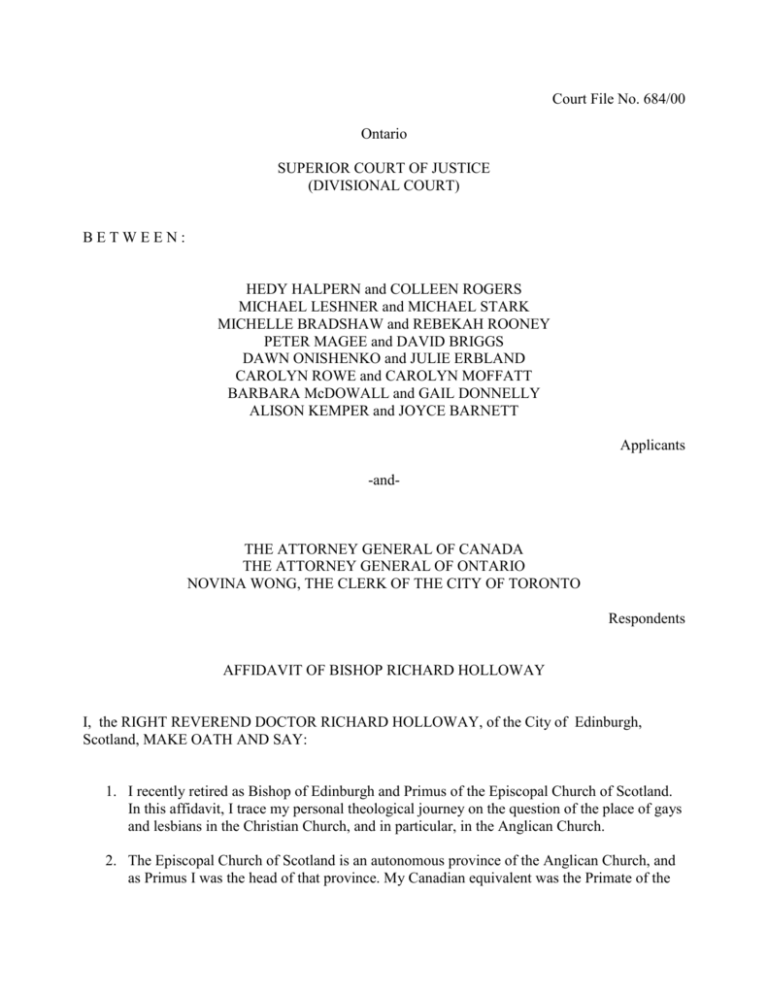
Court File No. 684/00 Ontario SUPERIOR COURT OF JUSTICE (DIVISIONAL COURT) BETWEEN: HEDY HALPERN and COLLEEN ROGERS MICHAEL LESHNER and MICHAEL STARK MICHELLE BRADSHAW and REBEKAH ROONEY PETER MAGEE and DAVID BRIGGS DAWN ONISHENKO and JULIE ERBLAND CAROLYN ROWE and CAROLYN MOFFATT BARBARA McDOWALL and GAIL DONNELLY ALISON KEMPER and JOYCE BARNETT Applicants -and- THE ATTORNEY GENERAL OF CANADA THE ATTORNEY GENERAL OF ONTARIO NOVINA WONG, THE CLERK OF THE CITY OF TORONTO Respondents AFFIDAVIT OF BISHOP RICHARD HOLLOWAY I, the RIGHT REVEREND DOCTOR RICHARD HOLLOWAY, of the City of Edinburgh, Scotland, MAKE OATH AND SAY: 1. I recently retired as Bishop of Edinburgh and Primus of the Episcopal Church of Scotland. In this affidavit, I trace my personal theological journey on the question of the place of gays and lesbians in the Christian Church, and in particular, in the Anglican Church. 2. The Episcopal Church of Scotland is an autonomous province of the Anglican Church, and as Primus I was the head of that province. My Canadian equivalent was the Primate of the Anglican Church of Canada. I understand that the Anglican Church is Canada's third largest Christian denomination. 3. I grew up in a poor family in Scotland. I am a heterosexual, but on reflection I realize that I was aware of the presence of gay men around me from my boyhood. Many of my earlier contacts with the gay community were with gay men, perhaps because I am a male myself and perhaps because of the formerly exclusively male nature of the Anglican priesthood in the UK, particularly in that section known as "Anglo-Catholic", to which I belonged. 4. When I was a young guy, I was drawn back to the Anglican Church by a man whom I now realize to have been a closeted gay priest. I felt the grace of God through him as he ministered to me. I believe that this priest was touched by the grace of God because of his brokenness, which I believe connected him at a deep spiritual level to the brokenness of Christ. In the 1940's and 1950's, homosexuality was a taboo that was often not even discussed. Homosexuality was a criminal offence for gay men, and I was aware that homosexual behavior could end in a prison sentence. A number of Anglican priests met this shameful fate. Those who avoided scandal carried the burden of this oppression inside them. The atmosphere was very destructive for gay men. Indeed, the priest who had shown me God's grace ended his days as a layman, having become an alcoholic and being debarred from the priesthood, probably because he was gay. 5. As a boy, I fell in love with the beautiful and elaborate rituals and liturgy of the Anglocatholic tradition of the Anglican Church. The Anglo-catholic movement grew to prominence in the nineteenth century, and was aimed at reviving the more traditional rituals of the ancient Catholic Church within the Anglican Church. The Anglo-catholics are the "highest" of the "high Anglicans." An example of an Anglo-catholic parish is St. Mary Magdalene Anglican Church in Toronto. 6. I subsequently became ordained as a priest myself. Although I am a heterosexual man who is married with children, during my career it became apparent to me that there were many gay men who were quietly serving as priests in the Anglican Church, and especially in the Anglo-catholic parishes. 7. In 1967, the Wolfenden Report's recommendations finally became law in Britain, permitting homosexual activity between two consenting adults in private. The Archbishop of Canterbury at the time expressed the view that while homosexuality was likely a sin, it should not be a crime. That probably reflected my own thinking at the time. 8. I was eventually posted to Old St. Paul's, an Anglo-catholic parish in Edinburgh that had a number of gay men in the congregation. In the early 1970's, I announced there that I planned a series of sermons on sex. I felt that this was an important subject, because like many Christians, I had struggled with feelings that my own sexuality, although heterosexual, was "dirty." 9. My sermons were going to examine the troubled history and contemporary tension in the Christian Church on the topic of sex. Although the authors of the Bible apparently did not see sexual matters as a priority, it was a subject of concern to a number of later prominent Christian theologians, notably St. Augustine and St. Jerome. From their teachings emerged the notion that the holiest condition for a Christian was celibacy, and that marriage was a distant second best for good Christians. Even within marriage, according to their teaching sex was only to be for the purposes of procreation and sex for pleasure even between married persons was sinful. This doctrine remains important in the Roman Catholic Church and in part supports their requirement of priestly celibacy. Although Anglican priests are permitted to marry, I did feel I was somewhat of a spiritual failure as I could not face a life of celibacy and chose to marry instead. I believe that these Medieval Christian teachings, teachings that are very negative about sex in general, still influence the thinking of many Christians today, including their attitudes toward homosexuality. 10. Before I presented the sermon series, a member of the parish approached me who was a self-described "screaming queer." An outrageously camp man, he was the most courageous man I have ever met. 11. He invited me to include a discussion of homosexuality in the series. I agreed, and I did so, although it was a modest effort at the time. 12. Later, in the early 1970's, this same man approached me with a friend. He announced that they were in love and he asked me to perform a ceremony of blessing of their union in my church. I did so. By this time, I had moved to the view that homosexuality was not a sin, and that the love of Jesus Christ that was extended by Him to social outcasts in His lifetime, should not be denied by the Church to gays and lesbians. 13. Later, I was posted to the Church of the Advent in Boston, Massachusetts, which also had a large gay congregation. There I was introduced to feminist theology, and became profoundly influenced by arguments about the role of women in the Church. I was also impressed with the solidarity between the feminists and gay men, who were working together to drag the Church into the modern era on these issues. 14. My theology developed considerably during this time. Although I considered myself to be a liberal, I came to realize that the conservatives were right about one thing - that the ordination of women would be a defining issue for the Church. At that time, like the Roman Catholic Church, the Anglican Church did not ordain women. The question was whether the Church could get beyond the weight of traditional practices that had scriptural support, and instead embrace a modern theology that was more consistent with the Christian principles of love and respect for all human beings. 15. I eventually returned to the United Kingdom, and I was later elected Bishop of Edinburgh in 1986. In 1992 I was elected Primus of the Scottish Episcopal Church. At first, like most Anglican bishops, I was fairly cautious, diplomatic and uncontroversial, trying to avoid giving offence in a hierarchical and traditional Church. However, events impelled me to become increasingly outspoken. 16. I was increasingly frustrated by the foot-dragging in the Anglican Church over the ordination of women, and was particularly disturbed to see closeted gay priests I knew being among the most vocal and misogynist opponents. I believe this attack was fuelled to a considerable extent by their internalized homophobia. The Anglican Church worldwide remains divided on the question of women priests, with some provinces, such as Canada, having female bishops and other provinces, such as England, limiting women's ordination to the priesthood. 17. I then watched the emergence of an even more disturbing trend in the Church. The old unspoken "don't ask, don't tell" policy on gay priests, that had seemingly served us reasonably well, was supplanted by something of a witch hunt aimed at exposing gay priests and refusing them preferment. This trend was accompanied by a regressive trend in theology, marked by a revival of kind of Biblical literalism that I had thought was no longer a force in the Anglican Church. This literalist approach to scripture had long been dismissed as hopelessly un-historic and unscientific even when I was first studying theology years earlier. I was dismayed when we seemed to be going theologically backwards instead of forward, but the worst was yet to come. 18. The nadir of these developments was the 1998 Lambeth Conference. The Lambeth Conference, called by the Archbishop of Canterbury every ten years, brings together the Anglican bishops worldwide. Some of us were hopeful that the 1998 conference would establish a commission to examine the theological and moral status of homosexuals in our Church, and that this might lead to a healthy dialogue and improvement in way the Church dealt with the subject. 19. The move to a more open position was supported by some prominent and respected bishops, including the recently retired Archbishop of Capetown, Desmond Tutu, a Nobel Laureate and probably the most respected Anglican in the world. 20. The search for a compromise was defeated by coalition of dissident traditionalists from the USA, Africa and Asia. Worse, a resolution condemning homosexuality was passed. Worst of all was the tone of the debate, which was marred by booing, hissing, and insults. One bishop likened it to a Nuremberg rally. It was the most horrible experience of my life. 21. There are 4 principal attitudes in among Christians toward homosexuals today: (a) Punitive Non-acceptance: these persons not only condemn homosexuality as a sin, they support criminal sanctions and even death for homosexuals; (b) Non-punitive non-acceptance: these persons believe that homosexuals should be left alone and tolerated, but that they should not be given the same civil rights as heterosexuals; (c) Partial acceptance: Sometimes called the liberal position, this view supports equal rights for homosexuals provided that they conform to heterosexual conventions of behaviour, such as by living in monogamous relationships; (d) Total acceptance: This position asserts that homosexuals should be entitled to equal rights with heterosexuals, and that they should be free to develop and enjoy their own sexuality in accordance with their own norms. 22. Lambeth marked an attempt to move the Anglican Church to partial acceptance. Instead, the position became entrenched at non-punitive non-acceptance, at best. Many bishops advocated punitive non-acceptance, including one memorable remark by a bishop who claimed that there were no homosexuals in Africa, but that the ones they found, they stoned. I was very distressed by these types of remarks. 23. I am deeply pessimistic about whether the Anglican Church will move toward a more enlightened position on this question in my lifetime. I observe with particular regret that closeted priests in the Church, who fear exposure, are among the greatest obstacles to progress. 24. I am quietly satisfied with the fact that one of the most moving acts of my episcopate was to celebrate a Mass honouring the 25th anniversary of the wedding of the two men at which I had officiated in Edinburgh in the early 1970's. While this union of my friends is not officially recognized by church or state in Britain, it has proved to be a bonded relationship of absolute integrity. 25. My homeland of Scotland has a tragic history of terrible conflict and bloodshed over attempts by religious groups to impose their views on others. Modern societies have learned that no single group has a monopoly on the truth, and that societies benefit from respecting diverse and conflicting religious views. 26. I do not believe that homosexuality is a sin, but rather it is a natural fact, a gift from God. I have no theological objection to marriage between two persons of the same sex. I believe that gays and lesbians are capable of forming loving and enduring relationships, which are entitled to the blessing of the Church. Although my opinion may be a minority opinion within the Anglican faith at present, and while it is certainly not the official policy of the Anglican Church, I believe that there is an increasing number of persons of great learning and faith who agree with me. I know that there are many Anglican priests, male and female, gay and straight, who would happily marry persons of the same sex if they were permitted to do so. In Toronto, for example, I recently spoke at Holy Trinity Anglican Church at a conference called "Loving Justice" about homosexuality and Christianity; Holy Trinity has a long tradition of outreach to and support for social justice, including equality for gays and lesbians. 27. I am familiar with the Universal Fellowship of Metropolitan Community Churches. It is a new, but legitimate Christian denomination. I not only respect its teachings on homosexuality and Christianity, I personally agree with its view that there is no inconsistency between being a good Christian and a practicing homosexual. While many traditional Christian churches might officially disagree with this position, there are many within those churches who share my belief and who view such official Church policy as outdated and wrong. 28. I am familiar with the ancient Christian practice of publishing banns of marriage. I have published banns myself for opposite sex couples. Although I have not done so for a same sex couple, I would have no personal objection to doing so and to marrying the couple subsequently, although this would not be a process recognized by the Anglican Church in Britain, nor to my knowledge by the secular law of Britain, at present. 29. I am aware that the MCCT plans to publish banns of marriage and to marry same sex couples. I applaud the MCCT for taking this step to advance justice and Christian love. I would regret it if Canadian Governments failed to respect their sincere religious beliefs by refusing to recognize such a marriage. ___________________________________ BISHOP RICHARD HOLLOWAY
